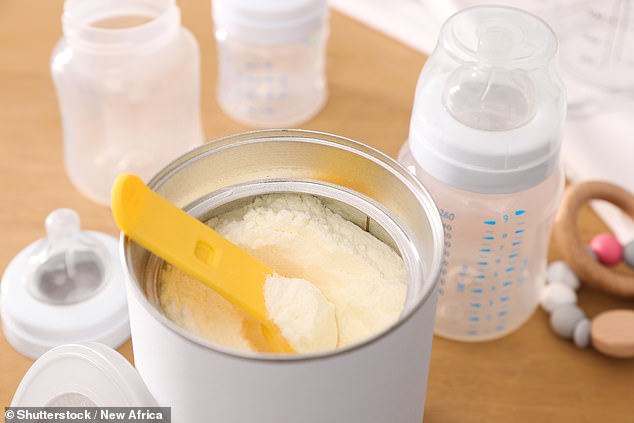Influencers should be BANNED from promoting formula milk on social media, WHO says
Influencers should be banned from promoting bottle feeding on social media, the World Health Organization says.
Experts say manufacturers are increasingly using ‘exploitative marketing’ online to encourage parents to switch to formula or buy more expensive products than necessary.
The company said the latest update to its marketing guidelines, published this month, was essential to keep regulations in line with the rapidly changing developments in the digital world.
“Digital environments are quickly becoming the leading source of exposure for the promotion of breast milk substitutes worldwide, digital marketing increases the reach and power of advertising and…exposure to digital marketing increases the purchase and use of breast milk substitutes,” the WHO said . .
The new guidelines propose a ban on influencers directly promoting formula products, but also state that they should not be paid by formula companies to promote branded content, such as online ‘baby clubs’ or parent advice lines, on social media.
Loose Women panellist Stacey Solomon and her son Rex have previously appeared in social media videos promoting formula manufacturer Cow & Gate’s Baby Club

Love Island contestant Olivia Bowen also featured in videos promoting the brand, alongside her husband and fellow Love Island star Alex
In Britain, formula manufacturer Cow & Gate has previously featured celebrities such as Loose Women panelist Stacey Solomon and Love Island contestant Olivia Bowen in videos promoting the C&G Baby Club on Facebook and Instagram.
Both celebrity moms have also independently posted about their breastfeeding experiences.
And countless smaller lifestyle and parenting influencers have been paid to market follow-on milk products (designed for babies over six months) from brands like Aptamil and Kendamil directly to their thousands of social media followers.
Amy Brown, professor of children’s public health at Swansea University, welcomed the proposed crackdown on influencer marketing.
“While there may be exceptions, influencers are generally not experts in child nutrition and public health,” she said.
“They share their opinions… (which) are not necessarily based on evidence or good information for others, and they may unintentionally cause more harm than good.
‘These guidelines will help prevent that.’
She added: ‘A lot of the information we get now comes through social media and digital marketing – the (formula) industry has taken advantage of that to find regulatory loopholes to reach parents.
‘Parents deserve information and support that must be fact-based and accurate.’
Speaking at the Unicef UK Baby Friendly Initiative Conference in Harrogate this week, Shereen Fisher, director of the Baby Friendly Initiative, said: ‘This is about protecting families from aggressive marketing techniques.
‘Restricting marketing does not mean that the products cannot be sold or that factual scientific information cannot be made available about them.
‘It also does not limit the choice of parents.
“It is simply intended to ensure that their choices are made on the basis of complete and unbiased information rather than misleading, inaccurate or biased marketing claims.”
Releasing new guidance on “regulatory measures aimed at restricting the digital marketing of breast milk substitutes,” the WHO said regulations were needed to “prohibit the use of digital marketing tools,” including “advertising on social media platforms” and “influencer marketing,” adding that healthcare professionals should not be paid to promote formula online.
It also called for an end to formula companies setting up ‘baby clubs’ on social media – such as the C&G Baby Club – or offering parenting advice, and a ban on companies using digital marketing to ‘build relationships’ with parents.
Manufacturers should also be restrained from “encouraging or enabling consumers to share, respond to or comment on marketing content,” it added.
Although an international WHO code of marketing already prohibits brands from directly targeting new parents, it does not explicitly include all forms of digital marketing.

Experts say manufacturers are increasingly using ‘exploitative marketing’ to encourage parents to switch to formula or buy more expensive products than necessary
The guidelines are not legally binding, but individual WHO member countries – including Britain – are expected to eventually update their laws to bring them into line with WHO recommendations.
But the update comes as it was revealed that only half of baby and follow-on products sold in Britain currently comply with UK labeling laws.
Researchers led by the London School of Hygiene & Tropical Medicine analyzed 57 product labels and found that only 50 percent fully complied with British legislation.
The research, presented at the conference, found that labels contained claims ‘that idealise bottle feeding or nutrition and health claims’, which is not permitted.
Researchers said they also included promotional content such as telephone advice lines for new parents, which was an example of companies looking to “build relationship(s) with mothers/caregivers.”
They said the labels “violated” many of the laws and regulations designed to protect parents from “exploitative” marketing, and showed “how manufacturers use product labels as marketing tools to increase sales.”
“UK law needs to be better enforced and strengthened in line with the (WHO) Code for the Protection of Breastfeeding and Safe and Appropriate Formula Feeding,” the authors said.
A spokesperson for Danone, which makes Aptamil and Cow & Gate, said: ‘How to feed your child is an important decision for every parent.
‘Although breast milk provides babies with the best nutritional start in life, some parents are unable to breastfeed.
‘Many also choose to fully or partially bottle-feed their children.
‘Bottle feeding is a quality, legitimate option that should be respected and parents should not be made to feel judged when formula feeding their little one.
‘When it comes to nutrition, parents turn to healthcare providers, family and friends, as well as online resources.
‘Trying to ban access to information about baby food hinders parents from making an informed choice and stigmatizes a legitimate feeding option.
‘Infant formula is the only recognized alternative to breast milk and is highly regulated to ensure appropriate communication, labeling and marketing of products; we strictly adhere to these British regulations.’
